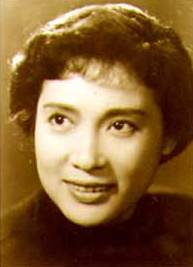Qin Yi
| Qin Yi | |||||||||
|---|---|---|---|---|---|---|---|---|---|
 |
|||||||||
| Background information | |||||||||
| Chinese name | 秦怡 | ||||||||
| Pinyin | Qín Yí (Mandarin) | ||||||||
| Birth name | Qin Dehe | ||||||||
| Born |
31 January 1922 Shanghai, Republic of China |
||||||||
| Occupation | Actress | ||||||||
| Years active | 1938 – present | ||||||||
| Spouse(s) |
Chen Tianguo (m. 1939) Jin Yan (m. 1947; d. 1983) |
||||||||
| Children | Jin Feiheng Jin Jie |
||||||||
|
Awards
|
|||||||||
| Qin Yi | |||||||||||||
| Chinese | 秦怡 | ||||||||||||
|---|---|---|---|---|---|---|---|---|---|---|---|---|---|
|
|||||||||||||
| Transcriptions | |
|---|---|
| Standard Mandarin | |
| Hanyu Pinyin | Qín Yí |
| Wade–Giles | Ch'in I |
| Wu | |
| Romanization | Dzin Yij |
Qin Yi (Chinese: 秦怡; Wade–Giles: Ch'in I; born 31 January 1922) is a Chinese film and drama actress. She gained fame for her stage performances in the war-time capital Chongqing during the Second Sino-Japanese War. After the war, she became one of China's most popular film actresses throughout the 1950s and the 1960s, and was recognized as one of the country's top four actresses. Premier Zhou Enlai called her the "most beautiful woman in China".
Qin Yi was married to Jin Yan, the Korean-born actor known as China's "Film Emperor" in the 1930s and 1940s. She spent decades caring for their son, who suffered from schizophrenia.
Qin Yi was born in 1922 to a wealthy Shanghai family. Her name at birth was Qin Dehe (Chinese: 秦德和). She was one of the many daughters in the family. She enjoyed watching movies and Ruan Lingyu was her favourite actress.
After the Japanese invasion of China in 1937, Qin Yi moved to Wuhan and became active in anti-Japanese activities. When Wuhan also fell to the Japanese, Qin Yi moved to the war-time capital Chongqing in 1938, and received actor training at the China Movie Studio. She joined several theatre groups, and acted in dozens of plays, including The Good Earth Huichun, Imperial Minister, and La Traviata. In 1943, the influential playwright Xia Yan first named her with Shu Xiuwen, Zhang Ruifang, and Bai Yang as China's "four great drama actresses" (四大名旦). The label became widely known, and after the founding of the People's Republic of China in 1949, the four were officially recognized by the new government as the "Top Four Actresses of China".
...
Wikipedia
